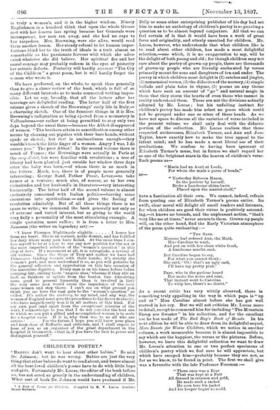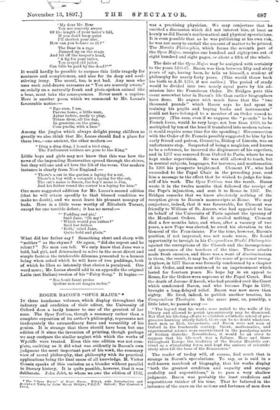CHILDREN'S POETRY.*
"BABIES don't want to hear about other babies." So said Dr. Johnson ; but he was wrong. Babies are just the very thing that other babies do want to read about, and hence almost all the best-loved children's poems have to do with little boys and girls. Fortunately Mr. Lucas, the editor of the book before us, has not erred so greatly in the understanding of children. What sort of book Dr. Johnson would have produced if Mr.
• A Book of Verses for Children. Compiled by E. V. Lucia. London : Grant Richards.
Dilly or some other enterprising publisher of his day had set him to make an anthology of children's poetry is so puzzling a question as to be almost beyond conjecture. All that we can feel certain of is that it would have been a work of great force and originality, and utterly unsuited for children. Mr. Lucas, however, who understands that what children like is to read about other children, has made a most delightful selection,—one which, it is no exaggeration to say, will be the delight of both young and old ; for though children may not care about the poetry of grown-up people, there are thousands of grown-up people who are literally enchanted by verses primarily meant for sons and daughters of ten and under. The
poetry in which children most delight is (1) catches and jingles, (2) nonsensical verses, (3) the didactics of the nursery, (4) simple
ballads and plain tales in rhyme, (5) poems on any theme which have such an amount of " go " and natural magic in them that they storm the hearts of even those who cannot in reality understand them. These are not the divisions actually
adopted by Mr. Lucas ; but his unfailing instinct for children's poetry has made him select no poem which could not be grouped under one or other of these heads. As we
have not space to discuss all the varieties of verse included in the present volume we shall only deal with the didactic portion of the collection. Mr. Lucas realises that those respected authoresses, Elizabeth Turner, and Ann and Jane Taylor, knew exactly how to make the true appeal to the
infant mind; and he has made a most liberal use of their productions. We confess to having been ignorant of Elizabeth Turner's muse, but in future we shall regard her as one of the brightest stars in the heaven of children's verse. Stich poems as— "Maria had an Aunt at Leeds,
For whom she made a purse of beads," "Yesterday Rebecca Mason, In the parlour by herself, Broke a handsome china-basin Placed upon the mantel-shelf,"
have a fascination all their own. We cannot, indeed, refrain from quoting one of Elizabeth Turner's poems entire. Its
swift, clear moral will delight all small readers and listeners, for when children are good their virtue is positively astound- ing,—it knows no bounds, and the unpleasant notion, "that's very like me at times," never occurs to them. Grown-up people will, on the other hand, find the Early Victorian atmosphere of the poem quite enchanting : — "Tax SASH.
Mamma had ordered Ann, the Maid, Miss Caroline to wash, And put on with her clean white frock, A handsome muslin sash.
But Caroline began to cry, For what you cannot think ;
She said, 'Oh! that's an ugly sash,
I'll have my pretty pink.'
Papa, who in the parlour heard Her make the noise and rout, That instant went to Caroline To whip her, there's no doubt."
As a recent critic has very wittily observed, there is something truly appalling in the way in which papa is "up and at" Miss Caroline almost before she has got well started in her cry. But we will not criticise Mr. Lucas more in detail, except to commend him for including "The Mountain Sheep are Sweeter" in his collection, and for the excellent use he has made of The Bad Boy's Book of Beasts. In his next edition be will be able to draw from its delightful sequel, More Beasts for Worse Children, which we notice in another column, a work memorable because it is almost impossible to
say which are the happiest, the verses or the pictures. Before, however, we leave this delightful collection we want to draw Mr. Lucas's attention to one or two perfect specimens of children's poetry which we feel sure he will appreciate, but which have escaped him—probably because they are not, as far as we know, to be found in print. The first we shall give was a favourite with the late Professor Freeman :—
"There once was a Bear That was kept at a Fair
All dressed in crimson and gold, He made such a racket He soon tore his jacket And his keeper began to scold.
or-
'My dear Mr. Bear You are scarcely aware Of the length of your tailor's bill, If you don't keep quiet I'll shorten your diet, How can you behave so ill ? '
The Bear in a rage Jumped up on the stage And bit off the keeper's head, A fig for your tailor, You stupid old jailer, Can bills be paid by the dead?"
It would hardly be possible to surpass this little tragedy for
neatness and completeness, and also for its deep and soul- stirring irony. The moral, too, is not bad. Any man who uses such cold-drawn sarcasms as "You are scarcely aware," especially on a naturally frank and plain-spoken animal like a bear, must take the consequences. Never mock a captive. Here is another poem which we commend to Mr. Lucas's favourable notice:—
" Ego sum, I am, Parvus home, a little man, Aptus Indere, ready to play, Totam diem, all the day, In gramine, on the grass, Corn puella, with a lass."
Among the jingles which always delight young children so greatly we also think that Mr. Lucas should find a place for these two,—one ancient, the other modern :—
"Ding a ding ding, I heard a bird sing,
The Parliament soldiers are gone to the King."
Little boys and girls may not know that this was how the news of the impending Restoration spread through the shires, but they will one and all love the lilt of the verse. Our modern instance is clearly from New England :—
"There's a cat in the garden a laying for a rat, There's a boy with a catapult a laying for the cat, The cat's name is Susan, the boy's name is Jim, And his father round the corner is a laying for him."
One more suggested addition for Mr. Lucas's second edition (that he will attain speedily to that blessed condition we make no doubt), and we must leave his pleasant nosegay of buds. Here is a little verse worthy of Elizabeth Turner, except for one terrible defect; it has no moral:—
" ' Pudding and pie,'
Said Jane, 'Oh my !' Which would you rather?'
Said her father. 'Both,' cried Jane. Quite bold and plain."
What did her father say ? Something short and sharp with "neither" as the rhyme ? Or again, "did she repent and he relent?" No man can tell We only know that Jane was a bold, bad girl, and determined to solve in the most direct and simple fashion the intolerable dilemma presented to a human being when asked which he will have of two puddings, both of which he likes so intensely that choice is paralysed. One word more ; Mr. Lucas should add in an appendix the original Latin (not Italian) version of his "Fairy Song." It begins :—
" Nos beati fauni proles
Quibus non eat magna moles."







































 Previous page
Previous page